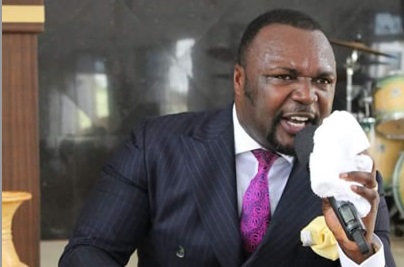
Collapse of Capital Bank: Ato Essien avoids prison - Court okays GH¢90m restitution agreement
The Accra High Court has convicted the founder of defunct Capital Bank, William Ato Essien, for stealing GH¢192.5 million of funds from the bank and ordered him to pay GH¢90 million to the state.
By repaying the amount, which was part of a liquidity support the Bank of Ghana (BoG) granted to the bank, Essien will not be sentenced to a prison term.
Already, the state has recovered GH¢101.2 million out of the GH¢192.5 million, while Essien will pay GH¢90 million as restitution to the state.
Essien pleaded guilty to 16 counts of stealing and money laundering and was accordingly convicted on his own plea by the court, presided over by Justice Eric Kyei Baffour.
However, the convict avoided a custodial sentence after the court accepted an agreement between him and the prosecution for him (Essien) to pay the GH¢90 million.
The agreement was pursuant to Section 35 of the Courts Act, 1993 (Act 459), which allows accused persons standing trial for causing financial loss to the state to pay the money and possibly avoid a custodial sentence.
Based on the agreement, Essien has already paid GH¢30 million (out of the remaining GH¢90 million) to the state and will pay the remaining GH¢60 million in three instalments of GH¢20 million by the close of next year.
Default
Essien risks going to prison if he defaults in paying the money in accordance with the terms of the agreement.
The court ordered him to pay the first instalment on or before April 28, 2023, the second on or before August 31, 2023 and the last instalment on or before December 15, 2023.
“In that event, the prosecution shall cause the immediate apprehension of the convict and produce him before the court as soon as practicable for custodial sentence to be passed on him according to law,” Justice Kyei Baffour ordered.
Prohibition
By virtue of pleading guilty, the court also barred Essien from being appointed as a director or holding any key management position in any bank or financial institution in line with the Banks and Specialised Deposit-Taking Institutions Act, 2016 (Act 930).
“Pursuant to section 58(1) of the Banks and Specialised Deposit-Taking Institutions Act, 2016 (Act 930), the first accused person is prohibited from being appointed or accepting an appointment as director or key management person of a bank, specialised deposit-taking institution or financial holding company,” Justice Kyei Baffour ordered.
Not guilty
The two others accused of conspiring with Essien to steal the money were acquitted and discharged after the court found them not guilty.
They are a former MD of Capital Bank, Fitzgerald Odonkor, and Tettey Nettey, the Chief Executive Officer of MC Management, a company said to be controlled by Essien.
Justice Kyei Baffour held that the evidence on record showed that Odonkor and Nettey did not act in anyway with the belief or intention that they were helping Essien to commit a crime.
“Second and third accused persons are found not guilty of all the charges against them and are accordingly acquitted and discharged,” the judge ruled.
Why GH¢90 million?
Justice Kyei Baffour, a Justice of the Court of Appeal, sitting as an additional High Court judge, had on December 1, this year rejected the agreement between Essien and the prosecution.
The judge was not convinced that the trial fell within the remit of Section 35 of Act 459 because according to him, the money Essien stole belonged to Capital Bank and not the state.
He also held Essien must pay interest on the GH¢90 million because he took the money from 2015 to 2016.
At yesterday’s hearing, a Deputy Attorney-General, Alfred Tuah-Yeboah, submitted to the court that Essien had caused economic loss to the state and not to Capital Bank.
According to him, BoG gave a liquidity support of GH¢620 million to Capital Bank and it was from that amount that Essien took the GH¢192.5 million.
Again, it was the contention of the Deputy A-G that the BoG revoked the licence of Capital Bank, with GCB Bank, a state bank taking over the assets of Capital Bank, while the state also expended over GH¢25 billion to pay depositors of the collapsed banks.
“There is, therefore, no doubt that the GH¢192.5 million forms part of the GH¢25 billion. In conclusion, it is our firm position that Section 35 of Act 459 is applicable to this instant case,” the Deputy A-G submitted.
On how the prosecution and Essien arrived at GH¢90 million, the Deputy A-G said the state had recovered GH¢100 million of the GH¢192.5 million stolen by Essien, with the remaining amount being GH¢92.5 million.
The GH¢100 million, he said, was used by Essien to buy shares in Capital Bank, but the state was able to reverse those transactions and recovered the money.
Essien, he explained, also refunded GH¢1.2 million during investigations, which reduced the amount to GH¢91.3 million.
At that point, Justice Kyei Baffour said he was satisfied with the explanation on the applicability of Section 35 of Act 459 to the case but was still not convinced that Essien should pay only GH¢90 million.
Lawyer for Essien, Thaddeus Sory, then explained to the court that GH¢35 million was repeated on the charge sheet, which mistakenly increased the amount said to have been taken by Essien.
What that meant, he said, was that Essien had to pay about GH¢56.3 million, meaning the GH¢90 million being paid by him was in excess of GH¢33 million, which would be the interest on the amount to the state.
After being convinced that Section 35 was applicable to the trial and that Essien will pay in excess of what he stole, Justice Kyei Baffour accepted the agreement.